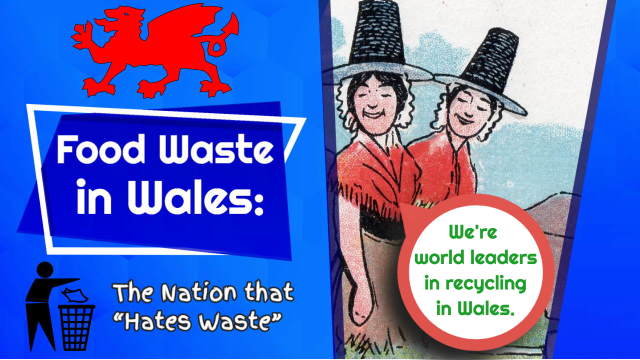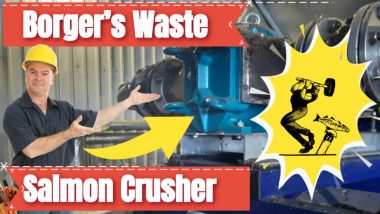The story of food waste in Wales in recent years has become an inspiration to many in the waste industry in general and the biogas industry in particular. It is so good that the nation that has been described as “hating waste”, has become a world leader for its high rate of organic recycling, ranking with the world's highest half-dozen nations for recycling rates.
How Wales Leads the Way in Food Waste Collection and Treatment
Wales is setting the global standard for managing food waste, creating renewable energy through innovative anaerobic digestion and biogas plant technologies. This article explores Wales' journey and how it offers a model for the world.
The urgent global problem of food waste treatment and disposal has met a formidable challenger – the Welsh Government. Their strategic initiatives provide critical lessons on sustainable waste management practices.
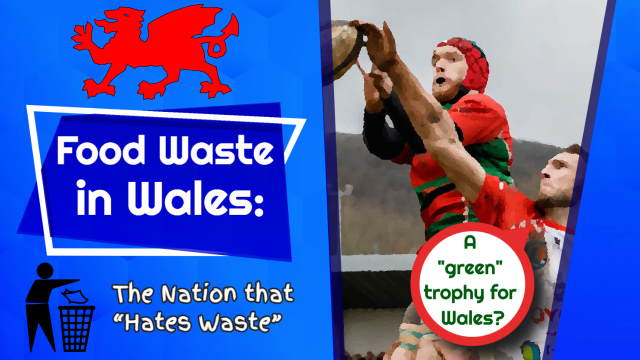
Food Waste in Wales: The Problem and its Impacts
In Wales, food waste is a pressing issue, with tonnes of edible food discarded annually. Such waste not only leads to economic loss but also poses significant environmental hazards, from landfill overfill to methane gas emissions. Recognising the scale of the issue, the Welsh Government has pioneered initiatives to reduce food waste and landfill disposal, showcasing the nation's commitment to a sustainable future.
The Welsh Government, guided by public opinion, has for some time been implementing plans to tackle the problem of food waste.
It simply has to be done, not just in Wales (and Scotland which also has an impressive food waste record) if the UK is to comply with its own goals as part of the Climate Change Act.
Promises made to the world to reduce net carbon emissions will drive action globally on food waste reduction. Pledges began to be made by governments at the 2015 Paris Accord and have been repeated since.
Welsh Government – Moving Ahead on Food Waste in Wales
The Welsh government is moving ahead with plans to as far as possible prevent food waste, and recycle the rest (using Anaerobic Digestion), while in England there has been little improvement and even some sliding-back in recent years.
In England, the overall recycling rate (at around 45%) is well below Wales' which is over 60%.
Wales has been doing particularly well with food waste through:
- reducing food waste processing losses,
- adding value to “close to sell-by-date” food,
- increase the reuse of food as animal feed while not endangering food safety,
- redistribution of surplus food,
- reducing food waste in the home by encouraging better food-buying practices when shopping etc.
For the management of food waste, which cannot be prevented or prepared for reuse, they have been implementing plans to:
- collect it ALL separately and treat it by Anaerobic Digestion. That includes not just household food waste, but industrial and commercial food waste as well.
- to produce a Quality Protocol-compliant output known as “digestate“ (which will be certified against the BSI PAS110 certification scheme to enable it) to be recycled to land as a natural fertiliser,
- recover and use the resultant biogas to generate renewable energy used as a renewable fuel.
These actions will be significant in reducing the impact of climate change from food waste in Wales.
Biogen Implements Sustainable Waste Management System of the Future
One of the key players in the food waste management scene in Wales is Biogen. This forward-thinking company specialises in the treatment of organic waste, primarily through anaerobic digestion. This process breaks down the organic material in food waste, producing biogas – a renewable source of energy.
Biogen's approach combines waste reduction and energy production, offering a sustainable and innovative solution for the problem of treatment and disposal of food waste in Wales.
Food Waste Biogas Plants in Wales
The Welsh Government has established arrangements to transport kerbside collected household food waste to biogas plants across the country. These plants, many operated by Biogen, use this waste to produce energy and fertilisers, further driving the circular economy model. This operation reduces landfill usage and environmental impacts while promoting renewable energy and soil health. By striving towards zero waste, Biogen is effecting positive change in both the local community and the environment.
Wales Advances Where England Awaits Action on Raising Food Waste Recycling Rates
Back in December 2018, Westminster published a long-awaited update of the previous long-outdated Waste Strategy, but so far there has been no action to implement it.
Fine words but with little action, this remains no more than a promise for 2/3rds of the population in England, who want to recycle their food waste but don't have access to a kerbside food waste collection service provided by their Council.
In contrast to England's lack of action, almost everyone in Wales has a food waste collection service already, and their government has its own clear legal and policy framework comprising:
- Waste (Wales) has set a statutory recycling target for Local Authorities to achieve an overall recycling rate of 70% by 2025, and the
- Landfill Allowances Scheme which restricts the amount of biodegradable municipal waste (BMW) sent to landfill.
In Wales, the assembly has recognized that this can't be done without central government support for the Local Authorities who need to implement this policy. They are providing funds for:
- An additional approximate £23 million of funding for separate collection of food waste (to bring 99% of households within the service). This is in fact funding which has been in place since 2008.
- Waste communications campaigns – “Love Food, Hate Waste and Recycle for Wales”.
- Procurement support for Anaerobic Digestion plant development.
Food Waste Collection in Wales Now
This means that the following is provided for Welsh householders:
- All residents are provided with kitchen caddies
- Most are provided with free liners.
That's the “carrot” which is waved in front of the Welsh public.
But, in return, there is a big “ask” on them to actually recycle. And, some would call this the “stick”, in the form of…
- Restrictions on what is placed in the mixed (black or “residual waste”) bag:
- Achieved through reduced frequency collections (all frequencies 2 weekly or less often),
- smaller bins, or a
- restriction on the number of mixed waste black bags which the Council's collection service will pick-up
- Stickers are attached to residual bins – ‘no food waste’
- Intensive communication campaigns
- Door knocking to explain the system/ encourage compliance.
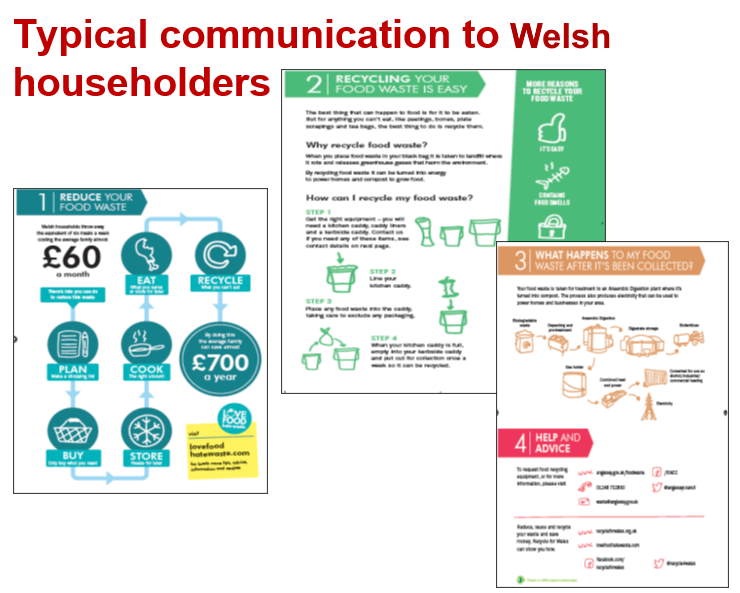
Waste Collection in Wales – “The Blueprint”
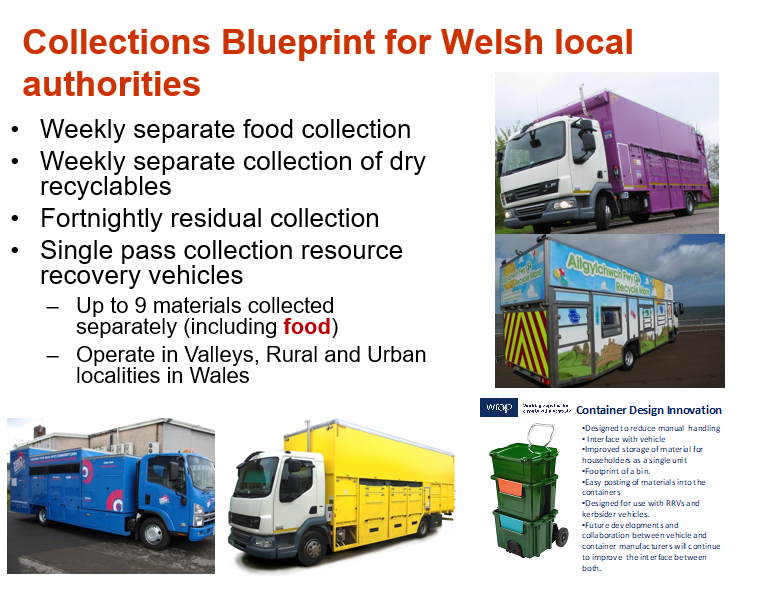
How Welsh Waste Recycling Targets Have Been Met All the Way to 2020
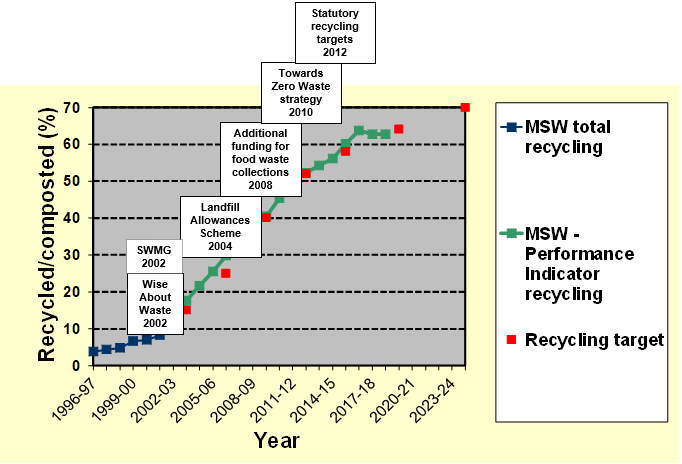
The Result Today: Wales is Top for Household Waste Recycling in the UK!
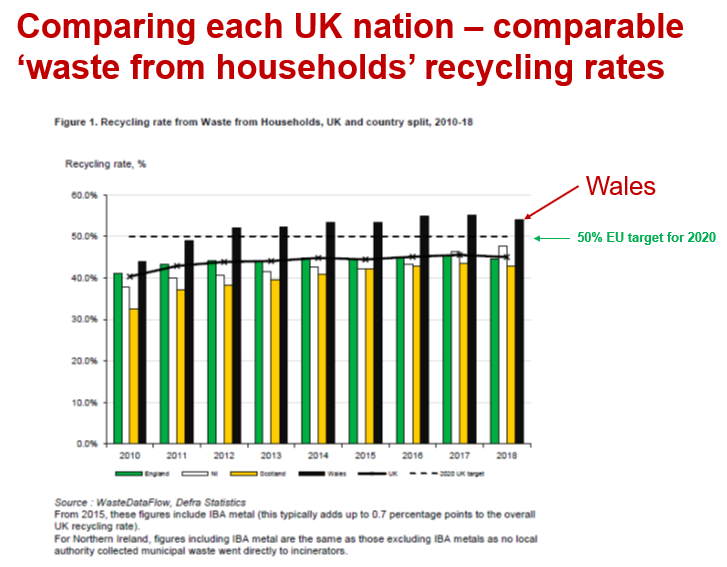
The Result: Wales 3rd from Top in The World by 2020!
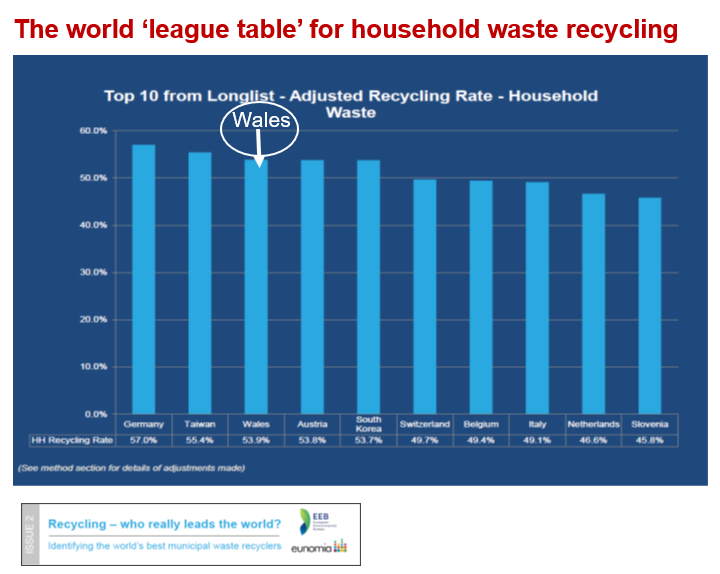
It is clear that Wales is an example to the rest of the UK, in just what can be achieved, when the whole population is provided with a separate food waste collection.
Whether, England, Scotland or Northern Ireland would be doing as well, or even better than Wales for recycling rates, if they too had the 100% availability of separate food waste collection, can only be guessed.
There is today a large disparity between the UK nations in terms of the percentage of households that are currently provided with a separate food waste collection service by their local authority. The table below shows the percentage of local authorities collecting food waste as a separate service in 2017/18.
| England | 35% |
| Wales | 100% |
| Scotland | 56% |
| Northern Ireland | 9% |
| UK | 39% |
Source: WRAP
The Municipal Food Waste Treatment Procurement Programme for Wales
The current leading status for Wales has come about as a result of the Welsh Municipal Food Waste Treatment Procurement Programme. That is an ongoing project which can be summarised as:
- £50m capital programme, delivered through public-private partnerships, to support local authorities in delivering sufficient food waste treatment capacity (from local authority collected food waste) to meet EU landfill diversion and statutory national recycling targets.
- The work is delivered through the work of 7 local authority “hubs” in the procurement programme (comprising 17 out of the 22 Welsh local authorities).
- The programme had, by 2020, delivered treatment capacity in anaerobic digestion plants of 141,000 tonnes per annum and was producing over 7MW of renewable electricity.
The programme has progressed to the point that at this time there are 7 biogas plants contracted to accept SSO (source-separated organics) Of these 7 Welsh AD facilities are in operation.
As you would expect with more biodegradable organic waste being sent to biogas plants in Wales, Wales also wins as the UK nation which puts the lowest proportion of its organic waste in landfills.
Looking to the Future for Further Food Waste Recycling Gains in Wales
There is still a whole lot to do to achieve the target of an overall recycling rate of 70% by 2025, for the total waste of the Welsh nation including their household residual mixed waste. That's not to forget residual industrial and commercial waste – which also contains a proportion of food waste and other easily digestible organic matter.
WRAP has stated that:
“The majority of the [residual] waste analyzed (74.5% (+/- 2.4%) or 450,478 tonnes annually), could have potentially been recycled.”
The Welsh Government announced in 2020 that it intended to bring forward regulations under the Environment (Wales) Act 2016. Those regulations are likely to include amendments to the Environmental Protection Act 1990 and Waste (Wales) Measure 2010 (as amended) and to:
- commence a ban on the disposal of food waste to sewers.
- It has consulted on options.
Proposed legal requirements for non-domestic premises
The next stage of the programme will be to improve the recycling rates of non-domestic wastes. If they are successful, and we have no reason to see why they won't be, Wales will quite possibly, during 2023, become a global leader in their rate of food waste avoidance, and when not preventable, recycling, via anaerobic digestion and biogas production. Furthermore, they may even beat Germany and Taiwan to the top place!
The occupiers of non-domestic premises in Wales will, in the next couple of years, present the following separately for collection.
- paper, card, glass, metal, plastic;
- food produced by premises producing more than 5kg/week;
- WEEE;
- textiles.
Those that collect these waste materials are to collect materials in the following streams
paper, card, glass, metal, plastic;
- food collected from premises producing more than 5kg/week;
- WEEE;
- textiles.
The disposal of food waste to sewer from business premises in Wales is expected to be prohibited.
The incineration of recyclable loads of some specified materials will be likely to be banned.
The landfilling of recyclable loads of the specified materials would be banned. In addition to the above materials, wood waste may be banned from landfills in Wales.
Lessons for the World – Food Waste in Wales Setting an Example
The Welsh approach to food waste management offers a blueprint for the rest of the world. By adhering to the waste hierarchy, prioritising prevention, reduction, and recycling, Wales has dramatically reduced food waste.
The last resort, when there's no other use for food waste, is to send it (specifically source-separated kitchen waste collected in caddies by the local council) to an anaerobic digestion plant. This model not only minimises waste but also converts it into a resource, creating a closed-loop system that benefits both the environment and the economy.
Conclusion to this Article About Successful Amelioration of the Climate Damaging Effects of Food Waste in Wales
Wales is a nation that has successfully turned the challenge of food waste into an opportunity for sustainability and renewable energy production. The Welsh model of waste management provides a valuable lesson for the rest of the world, showing us that a more sustainable future is possible through innovative and strategic practices.
We started this article by posing the question of whether Wales, which we described as the nation that “hates waste” might soon rise from being the third-best nation at recycling globally to the top spot!
We do indeed think that Wales could do just that. Why do we think the nation could be the best world recycler soon, especially when every other EU country has also been set the same 70% target?
The reason is that as described above, the Welsh government is far from done. In their Waste Strategy they have declared their intent to:
“Make more efficient use of our food: We will lead the way in eradicating avoidable food waste by looking at the whole supply chain and working with businesses from farm to fork to minimise waste and maximise resource efficiency.”
And, they have barely started their campaigning on improving the recycling rates of non-domestic wastes, wherein lies enormous potential.
But more important than all is, in our opinion the proven willingness of the people of Wales to separate and dispose of their food scraps and do that daily in millions of kitchens across the nation.
Images used in featured images: Rugby Players pxfuel.com “Free for commercial use” and Welsh Ladies from flickr.com CC0 1.0 Public Domain.



